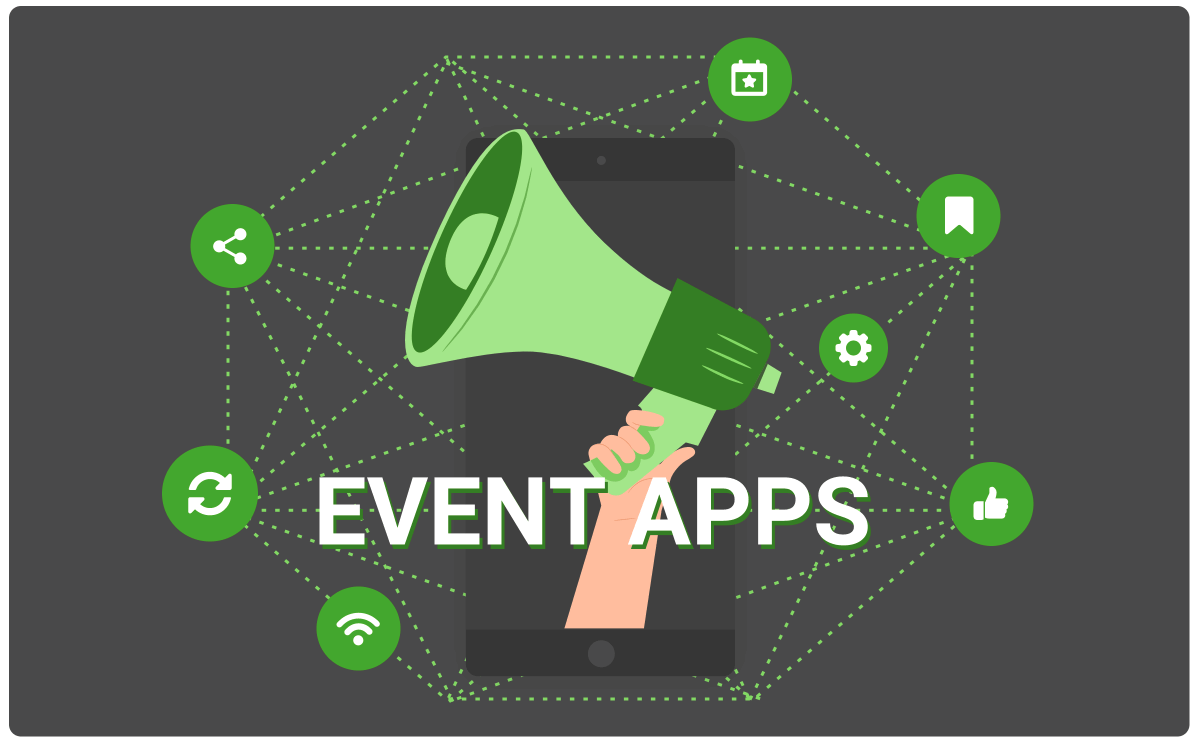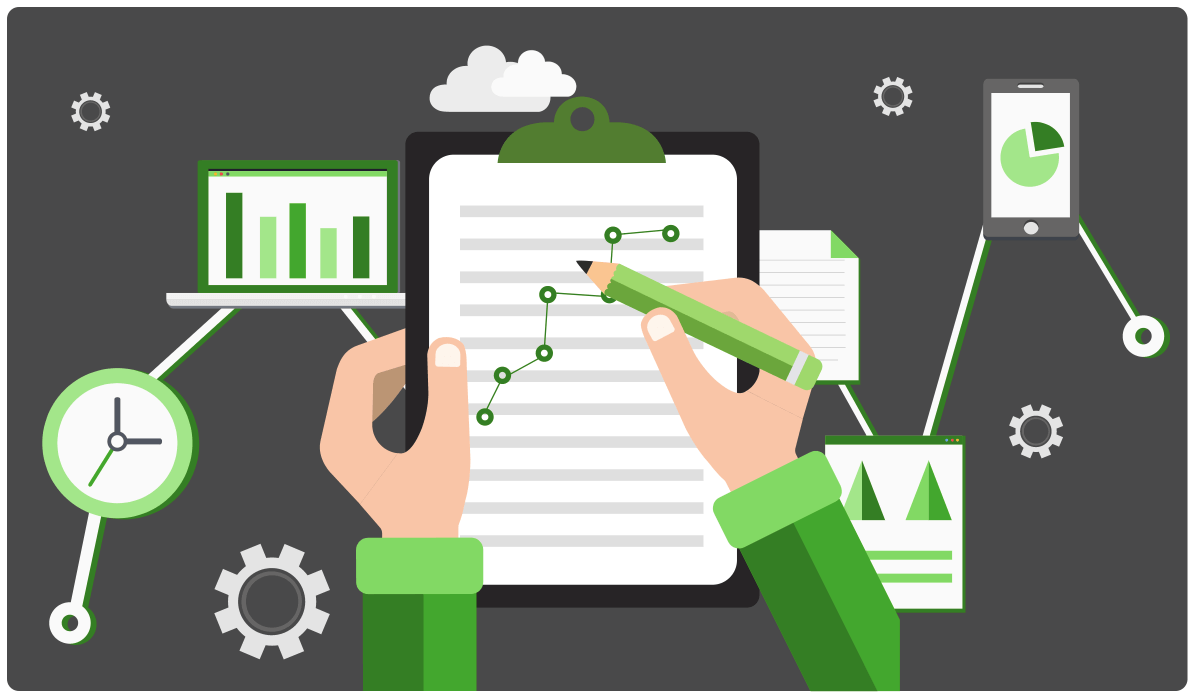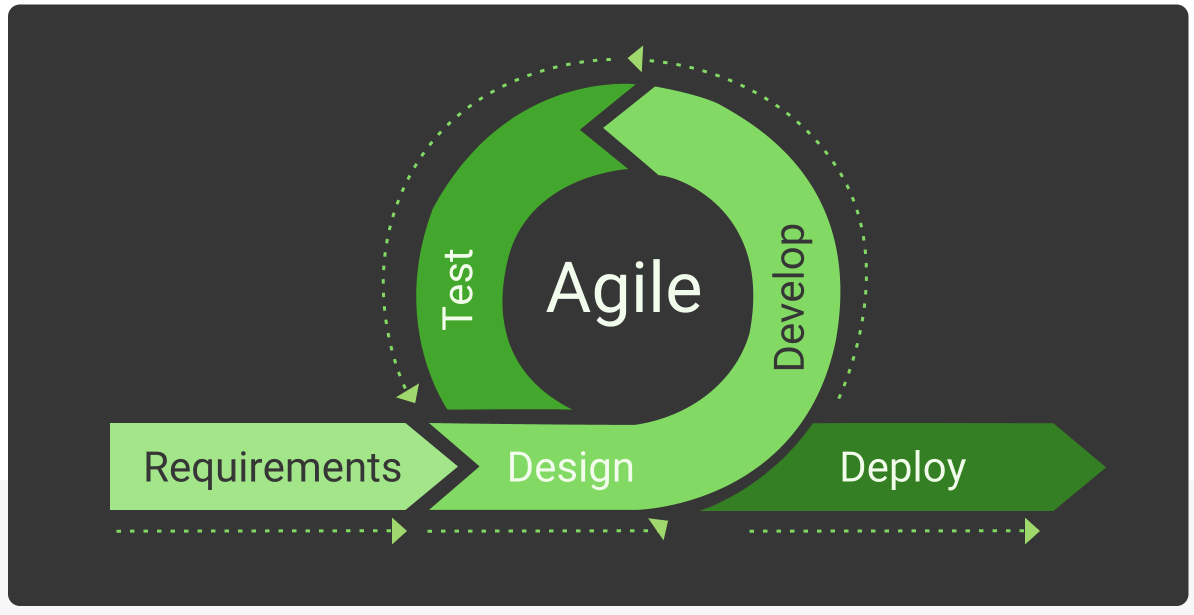The event industry is changing dramatically under the influence of the pandemic requirements. However, this is not a reason to give up the idea of making a mobile event app. What’s more, right now is a great opportunity to come up with something truly innovative that will help to cope with restrictions and new rules for health safety. At KeyUA, we know how to do it right and will share insider tips in this ultimate guide.
Event Planning Mobile Apps Types

There is no unified classification for event planning and scheduling apps since there are many solutions on the market, each tied to specific target users and different core functions. However, we suggest dividing them into four main categories.
Corporate event apps. These are the solutions used by businesses to organize, hold, and promote corporate and branded events.
Personal event apps. These are apps to schedule and plan all kinds of personal events - friendly meetings, weddings, birthdays, etc.
Event finders apps. These are event marketplaces that allow searching for events in specific locations and buying the tickets instantly.
Guest management apps. Usually, guest management functionality comes as a part of an event planner app; however, there are also standalone solutions for pre-registering and quick cheсk-ins.
What Are The Benefits of Planning an Event with the Help of an App
Now, let’s find out what are the benefits of creating this software for your enterprise.
Improve your branding. Branded events are an excellent way to showcase your goods, attract new customers and partners, and become better recognized locally.
Boost guest experience. With the help of advanced event holding applications, you can offer your guest a better experience. For example, you can allow them to get registered and check in with the help of an app and share useful content.
Plan more effectively. Event scheduling apps come with a lot of functions for planning, organizing, task assigning, and management. They also offer useful features for collaboration between team members and customers to ensure that everything goes as planned.
Share and promote your content. For example, in an event conference app, you can allow your guests to retrieve the discussed content for further studying after going home.
Get first-hand feedback. With the help of an event holding app, your guest can also share their impressions, rate your event, and leave suggestions for your future events.
Event Planning App Features
Let’s start your mobile event planning application development with an analysis of the features you may develop. Below are the most essential ones.
Log-in/Check-in. These functions are needed to get registered in the app. As an alternative, there may be a check-in function for your guests.
Task management. Event planning means a lot to be done. According to the Kanban approach, the users should be able to create and assign tasks, track their performance, and make changes to them with the help of task management.
Event website app builder. Branded events can’t be held without a branded landing page. You should come up with functionality to facilitate this task.
Social media integrations. There also needs to be the ability to promote an event through social media, which can be done instantly and continuously until the event’s date.
Seat planning. With this function, the users will be able to foresee the number of needed seats and plan their location to comfort each visitor.
Spending tracking. Tracking spending on event planning is also essential, so it would be wise to integrate your event planner with an accounting software the customers can use.
Security features. Your app should also follow the industry-accepted standard for personal and financial data security.
Analytical tools. They are needed to track registered visitors, qualified leads, users’ behavior, and other useful insights.
Email marketing integration. After the user is registered for the event, you will need to kindly remind them of the upcoming date, place, and time.
Content uploading and management. If you are planning a business or scientific conference, it makes sense to open access to content that will be discussed during the event.
Ticketing. There should also be a feature for selling and buying tickets, which highlights the importance of data protection and PCI following.
Sponsorship exposure. Most of the events are sponsored by leading brands. Mentioning them adds credibility to the event, so there should be a corresponding section.
Feedback forms. With their help, the visitors can share their impressions, rate an event, and participate in after-event surveys.
How to Make Money With Your Future App - Top Strategies

The benefits of an app for event planning are clear, but how to make money with its help? Several strategies suit different types of apps.
In-app ads
This is the classic way of monetizing the app. However, there are two important conditions for making it work. Firstly, your application should be already well-promoted and popular - otherwise, your ad publishers will not get any leads from your app. Secondly, you should match the ad theme with the theme of your app. For example, if it is a wedding planner app, the ads should center around wedding items or services. And lastly, the ads shouldn’t be intrusive for the users - otherwise, they will abandon your event planning app.
Subscription
You could also offer your users to subscribe to your app and open access to the advanced features or provide unlimited usage possibilities. This type of monetization is suitable for B2B event planners, like the wedding planner app mentioned above used by professional agencies.
Promoted listings
This monetization strategy is suitable for event finder apps with the possibility of purchasing tickets. For example, some event holders may promote their events and make their ads more visible on the top of the page for a longer time.
Fees and commissions
The previous strategy may either be combined with this one to make money for your event app or standalone. In this case, you will receive a fee from all the events that are organized and sell tickets through your app.
5 Stunning Even Planning Applications Examples
What are the best event planning projects? Below are our top picks.
Super Planner is a simple and affordable solution to plan an entertainment event and accurately foresee all the spendings.
Asana is a corporate event planner with strong collaborative features for scheduling, assigning, and keeping track of the event preparation tasks.
Social Tables is a guest management software that allows you to manage your guest list, plan seating, and diagram event features with 2d and 3d technologies.
Bizaboo is a tool that is suitable for medium and large business events planning. It has many powerful marketing features to promote an event, attract investments, and sell tickets.
Planning Pod is an all-in-one solution that promotes team collaboration and efficiency when it comes to event planning. It has all of the essential functions to organize a large event seamlessly and market it as effectively as possible.
Have a great idea on how to make your project better than competitive ones? We will be happy to discuss your idea under the NDA protections.
Share With UsDoes an Event Planning Application Creation Make Sense in Post-Pandemic Times?
According to the recent Events Tourism in the Eye of the COVID-19 Storm research, “The outbreak of COVID-19 has knocked down the event industry around the world. There is a long list of events for which attendees congregate as participants or spectators in the event. Business events need a wide range of facilities like convention and exhibition centers, a different range of hotels with banquet facilities, and several private and public amenities. Events have the potential to become the super spreading sources of infection if not organized with proper guidelines and apt measures.”
Experts unanimously say that the planning and event management industry will change in our eyes under the influence of the pandemic and new health safety requirements. At first, only those events that critically require the presence of visitors will be held. And after the post-pandemic crisis subsides and the world gets used to living by the new rules. New security measures will be developed for events as well. And this is where your event scheduling application can be especially useful.
For example, right now, you can create a completely innovative solution that will allow you to plan and conduct events in a post-pandemic reality. Using artificial intelligence, it is possible to calculate how many guests will be optimal based on the area of the room and the ability to ventilate.
You can also plan the seating of guests based on social distancing requirements. Computer vision technologies can recognize guests without a mask and send kind reminders to their applications to wear it. And these are just some of the possibilities that will definitely change the event industry but will also make it safer and more in line with new realities.
How to Create an Event Planning App Step by Step
Here is how to develop an event planning app following the LEAN methodology, thereby reducing the time and cost to do it.
Decide on the task. What is the core task your future app should perform? Try to focus on one essential feature and build the additional functionality around it.
Decide on the type. We’ve listed the types above, so categorize your future app to one of them to become clearer regarding the set features.
Decide on the set features. We’ve already mentioned the essential ones, so your task is to choose the features that suit your project best and be enough for MVP development.
Come up with the first design prototype. Like with any other solution, you should make an event app user friendly. To do it, you should think through users' journeys, their tasks, and pain points and come up with an easy to perceive and interact design solution.
Test your UX. Following the LEAN approach, you should test the experience of your users. UI/UX design is the stage that is sometimes skipped by novice startups, but here you may find the hidden pitfalls and develop ways to overcome them without risk to your budget.
Get in touch with a trusted vendor. There are a lot of developers on-demand in the modern IT market, and your task is to partner with the best within your budget. Choose a development vendor with experience in event development and a strong technical and business background.
Create an MVP. Creating a Minimum Viable Product is an essential part of the LEAN web development. This simplified solution allows you to determine how your project works in reality and what your target users think of it. That is why you should gather their feedback and take their suggestions into account.
Improve your app and prepare it for the final launch. This is the last step in your event application creation. Now, you should satisfy your target users’ final wishes and launch your product to the market.
Need a reliable assistant who will guide you through these stages? We know where risky pitfalls may be hidden and can make your path seamless.
Contact us
Event Planning App Development Tools
To smoothly go through all stages of your project development, you will need the following set of tools.
Research tools. These are economic research tools (SWOT, PEST), design research tools (Google Design Thinking), and UI/UX research tools (Lookback.io, Full Story).
Programming tools. The choice of programming tools highly depends on the operating system your project is developed for. For example, JavaScript is used for Android development, while Swift is the primary language for iOS programming.
Designs tools. There are a lot of design tools, the choice of which is also application-specific. Figma is the simplest example.
Testing tools. Testing your future app is crucial as it may save you hundreds of dollars, and most importantly, your reputation. As for the tools, the most popular are Selenium, Katalon Studio, and Silk Test.
Marketing tools. The list of marketing tools you may utilize is unlimited. Your choice will largely depend on the specifics of your solution and your marketing strategy and budget.
Additional tools. They may include protective and anti-fraud solutions and all kinds of plugins and integrations.
Which Approach Suits Your Event App Development Best
According to the Development Approaches for Mobile Applications research, “The choice of development approach to be used is crucial and has a strong impact throughout the entire life cycle of the application. This choice can hardly be changed in advanced stages since it would involve a complete reengineering of the software product. It is for this reason that a thorough analysis should be carried out beforehand to determine the most appropriate approach for a given project.”
Agile

Agile is the top approach used in modern web and mobile development. It allows you to achieve the highest flexibility without losing focus and productivity. The core idea of Agile is to be always ready to adapt to changes and react quickly. Agile makes even more sense when combined with the LEAN development methodology since the latter suggests testing everything before implementing it. This approach will be reasonable if you are not 100% sure about your target audience specifics, preferences, and behaviors since it allows you to quickly adjust the strategy accordingly.
Scrum/Kanban
Both Scrum and Kanban are Agile frameworks, and both of them suggest dividing the project into a lot of small, doable tasks. However, Scrum implies accurately defined roles, while there are cross-functional teams in Kanban. There are also some other differences, and the best approach should be chosen only after idea validation, business analysis, and technology choice.
Waterfall
The Waterfall methodology is reasonable when you already know what and how to develop step by step. Using this approach, you should be 100% sure that there will be no surprises, changes, and sudden switches of your target audience’s mood.
What Is the Cost to Develop an Event App
As always, the cost to make a mobile app for events is quite individual since it depends on the following essential factors.
The outsourcing model
As you know, there are three types of outsourcing contracts - Fixed Price, Time and Contract, and Dedicated Team. The Fixed Price contract is usually the most affordable; however, it is unlikely to suit an event app development. As for the two remaining types, there is a necessity to do a competent business analysis to determine the best fit. A dedicated team contract is the most expensive; however, the Time and Money alternative is the most likely to suit you best.
The location of your vendor
The factors affecting the final price don’t end with the outsourcing model. You should take the location of your vendor into account as well. For example, the cost to hire American programmers is $100-150 per hour, but if you decide to cooperate with Indian developers, it may cost you $15-30 accordingly. In this case, you should find the middle ground and choose event management software development services with the best price-quality ratio. To achieve this goal, you may consider a development team from Eastern Europe, for example, Ukraine.
The platform
The cost of your future event planning app will also depend on the platform that will support it. For example, cross-platform solutions are cheaper than native ones since you don’t need to develop two separate apps. Native apps are quite expensive in this industry, and development for iOS is more costly compared to Android app creation. The reason is that Apple has a lot of strict requirements to follow to get your application published in the App Store. The progressive web application may be a reasonable balance between cross-platform and native development since PWAs are quite lightweight and may work even without an Internet connection. This means that you will be able to plan your event regardless of the external conditions.
The specifics
You may also want to implement highly customized design solutions (which should be tested in advance), develop advanced functionality, additional protection tools, create a highly specific backend, and use all kinds of add-ons. Indeed, it will contribute to the user experience; however, it requires additional time and money to create.
Conclusion
You could build an event planning app to streamline tasks for your business or as a separate source of income by sharing it with other companies and/or individuals. What’s more, there is no sense of being afraid of post-pandemic changes. The human being is an easily adaptable creature, and very soon, all industries will recover and start their operations in a new, healthier way. Your event planning app is a way to catch the wave and create a truly innovative solution that users need.
Feel ready to revolutionize the event industry with your outstanding event planning application? Let us contribute.
Get Started Now







 Unit 1505 124 City Road, London, United Kingdom, EC1V 2NX
Unit 1505 124 City Road, London, United Kingdom, EC1V 2NX

Comments
Leave a comment